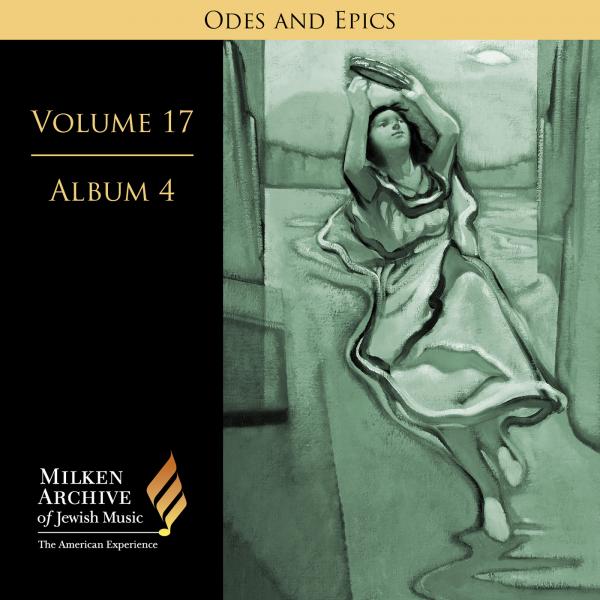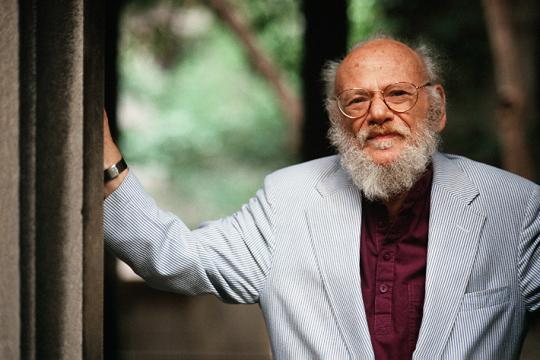Tracks
Track |
Time |
Play |
| The Covenant: I. It Was | 20:12 | |
| The Covenant: II. God of Mercy | 11:25 | |
| The Covenant: III. I Believe | 03:20 | |
| The Covenant: IV. It Shall | 07:17 |
Liner Notes
Ralph Shapey’s The Covenant, for soprano solo, sixteen instrumental players, and two prerecorded tapes, was composed to celebrate the thirtieth anniversary of the State of Israel. It is therefore, in the words of the composer, “dedicated to the miracle of the rebirth of Israel.” But he always hastened to add that “it is meant for all humankind as well, to walk upright, in dignity, in the image of the Almighty or the supreme life force—as One.” In 1977 the twin themes of Israel’s international composition competition were the Holocaust and “rebirth,” and though this work was not written in connection with that competition, Shapey later pointed out that it was inspired by those themes.
He constructed the text from a variety of sacred and secular literary sources—Nelly Sachs (see the notes to "Memorial Candles" in Volume 19, Walt Whitman, Pierre Louÿs, Kadya Molodowsky, Ḥayyim Naḥman Bialik, Vera Klement, and the Hebrew Bible, as well as from inscriptions purportedly found on the walls of cellars where Jews hid from the Germans during the Holocaust.
The four sections, played without pause, refer to four significant incidents or transformative confirmations of faith in the history of the Jewish people: the Sinaitic covenant between God and the people as transmitted in Scripture by Moses; the Holocaust; a spirit of reaffirmation; and the biblical assurance of messianic redemption. “The second part is a more terrifying vision than even Schoenberg’s Survivor from Warsaw,” wrote critic Peter T. Daniels following a performance of The Covenant in Chicago,
In Shapey’s version, the poet’s “landscape of screams” is the key. The soprano is set against her taped self, now screaming, now singing high above the staff, now sinking below it. Synthesizer chords add to the fury. Over all, a disembodied voice recites kaddish [viz., kaddish yatom, the so-called doxology when it is recited in memory of the dead, as opposed to the other completely unrelated functions of the kaddish text and its variants; see the Reader’s Kaddish section of the notes to Thomas Beveridge’s Yizkor Requiem]. The work goes on to chordal epiphanies, and ends with a moving setting of the famous words carved opposite the United Nations, and a final Psalm of praise.
And the Chicago Tribune critic John von Rhein wrote:
The musical impulses and humanistic convictions that gave rise to Shapey’s oratorio Praise (1971) are both extended and intensified in his new work, The Covenant. The Covenant addresses itself essentially to the contemporary crisis of faith. It does so in a musical language that is often strident, prickly, dense and convoluted to the ear—but which is absolutely right for what Shapey wishes to say. And what he says has an intensity, seriousness and underlying vein of humanity that shines through the often thornily dissonant texture. The Covenant uses a complexity of emotion that is essential to all spiritually based music. All this adds up to a statement of surprising coherence and undeniable power—“romantic,” even lyrical, for all its violence.
Shapey always underscored that The Covenant was based on a specifically Jewish concept, both in its expression of Holocaust reverberations and in its emphasis on faith—though intertwined with his own subtle, complex, even unorthodox brand of faith. “It all relates to the question of individual faith,” he once said, “faith in humanity, faith in existence.” While the array of texts he chose might seem eclectic at first, they represent a carefully studied selection that combine, in his view, to give a sense of the Sinaitc covenant and its multiple ramifications throughout history.
Immediately following the premiere in Mandel Hall at the University of Chicago, a number of Holocaust survivors who had been in the audience approached Shapey to ask how, not having experienced the Holocaust, he could have known so astutely how to reflect its internal emotional levels. “How did you know?” one of them asked Shapey—as he recalled later—“You weren’t there as we were.” And more than once Shapey recalled his response: “I knew because my blood was there.”
The Covenant was composed while Shapey was in residence at the MacDowell Colony in Peterborough, New Hampshire, in July and August 1977, although he had been working on it in terms of thoughts, sketches, ideas, and consideration of texts for many years. “It was just something I had to do,” he proclaimed in a Milken Archive oral history interview twenty years later. “I had to write this piece—there was nothing else I could do.”
Lyrics
I. It Was
It was at the beginning
It was My beloved
It was1
I am the Lord thy God, and there is none else.
Beside me there is no God;
there is none beside me;
I form the light, and create darkness;
make I peace, and create I evil;
I am the Lord thy God that doeth all things.
(Old Testament: Isaiah.)
Therefore, if ye will hearken unto my voice
and keep my covenant, then ye shall be
mine own treasure among all peoples:
for all the earth is mine, ye shall be
unto me a kingdom of priests, a holy nation.
(Old Testament: Exodus.)
I am, even I, am the Lord:
beside me there is no Savior.
I have declared, and I have saved, and
I have announced, therefore ye are
my witnesses, I am the Lord, and I,
and I am God, I am.
(Old Testament: Exodus.)
I am the first, and I, I am the last
and beside me there is no God.
(Old Testament: Isaiah.)
I the Lord shall reign forever and ever.
(Old Testament: Exodus.)
I am, I am the Lord.
(Old Testament: Isaiah.)
I sing the body electric.
(Line excerpted from Leaves of Grass by Walt Whitman; in public domain.)
I sing of my flesh and my life.
(Line excerpted from Leaves of Grass by Walt Whitman; in public domain.)
II. God of Mercy
This is the landscape of screams!—
Ashen scream from visionary eye tortured blind—
O you bleeding eye in the tattered eclipse of the sun hung up to be dried by God in the cosmos—
O the night of the weeping children
O the night of the children branded for death!1
O God of Mercy for the time being choose another people.
We are tired of death, tired of corpses,
We have no more prayers.
For the time being choose another people.2
III. I Believe
Out of the Dead Letters welled forth songs of Life.3
I believe in the sun even when it is not shining,
I believe in love even when feeling it not,
I believe in God even when He is silent.
(Inscription on the walls of a cellar in Cologne, written by Jews hiding from the Nazis.)
O give me a stone colossus
dull hollow stone
honed by rain long forgotten
and from that hollow eye proclaim
the name
I cannot speak alone
Walking upright
I shed the promise of hereafter
becoming naked
before man
as a sea washed stone
bleaching on the endless sands.
(Inscription on the walls of a cellar in Cologne, written by Jews hiding from the Nazis.)
IV. It Shall
And it shall come to pass in the end of days,
that the mountain of the Lord’s house shall
be established at the top of the mountains,
And shall be exalted above the hills;
And all the nations shall flow unto it. And many peoples
shall go and say:
“Come ye, and let us go up to the mountain of the Lord,
To the house of the God of Jacob;
and He will teach us of His ways,
And we will walk in His paths,”
For out of Zion shall go forth the law,
And the Word of the Lord from Jerusalem.
And he shall judge between the nations,
And shall decide for many peoples:
And they shall beat their swords
into plowshares,
And their spears into pruning-hooks.
Nation shall not lift up sword against nation,
Neither shall they learn war any more.
(Old Testament: Isaiah)
O sing unto the lord, a new song
O sing unto the Lord, all the earth
O sing unto the Lord, Bless His name
Proclaim His salvation from day to day
Declare His glory among the nations
His marvelous works among all peoples
O sing unto the Lord.
(Old Testament: Psalms)
1. Lines excerpted from O the Chimneys by Nelly Sachs, translated by Michael Roloff and Michael Hamburger. Copyright ©1967 by Farrar, Straus and Giroux, Inc.
2. From God of Mercy by Kadia Molodowsky. Translated by Irving Howe. From A Treasury of Yiddish Poetry, edited by Irving Howe and Eliezer Greenberg. Copyright ©1969 by Irving Howe and Eliezer Greenberg.
3. Line excerpted from "And If the Angel Should Ask" by Hayyim Bialik. From Modern Hebrew Poetry A Bilingual Anthology. Ruth Finer Mintz, translator and editor. Copyright 1966 by the Regents of the University of California.
Credits
Composer: Ralph ShapeyPerformers: Elsa Charleston, Soprano; Contemporary Chamber Players of the University of Chicago; Ralph Shapey, Conductor
Additional Credits:Publisher: Presser
Text reprinted from the CRI (NWCR690) release.

